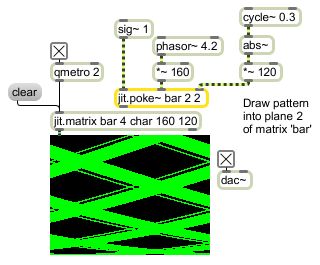Examples

Write an audio signal into a matrix
| Name | Type | Opt | Description |
|---|---|---|---|
| matrix_name | The name of the matrix to access (default = none) | ||
| dim_inputcount | The number of dimensions in the matrix (default = 2) | ||
| plane | The plane in a cell whose value is replaced by leftmost input (default = 0) |
| signal | In left inlet: Signal values arriving in this inlet will be stored at the dimensional locations specified by the signal inputs to the remaining inlets of the jit.poke~ object. The number of dimensional inlets will vary, depending on the value of the argument. In other inlets: Signal values arriving in this inlet specify the dimensional location of the data to be stored for the plane specified. A signal inlet is provided for each dimension specified by the [dim_inputcount] attribute (i.e., jit.poke~ bigcube 3 has 4 inlets -- one for input data, and one for each of the 3 dimensions of the matrix). |
| Name | Type | g/s | Description |
|---|---|---|---|
| matrix_name | symbol | The name of the matrix to access (default = none) | |
| normalize | int | Normalized input coordinates flag (default = 0) |

| Name | Description |
|---|---|
| jit.peek~ | Read matrix data as an audio signal |
| peek~ | Read and write sample values |
| poke~ | Write sample values to a buffer by index |
| jit.buffer~ | A matrix-friendly MSP buffer~ |
| Tutorial 27: Using MSP Audio in a Jitter Matrix | Tutorial 27: Using MSP Audio in a Jitter Matrix |